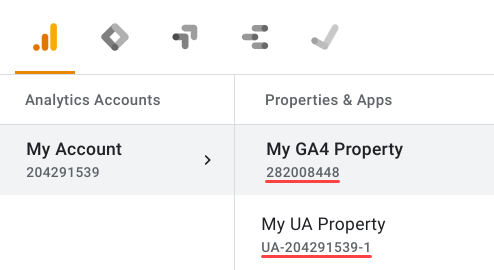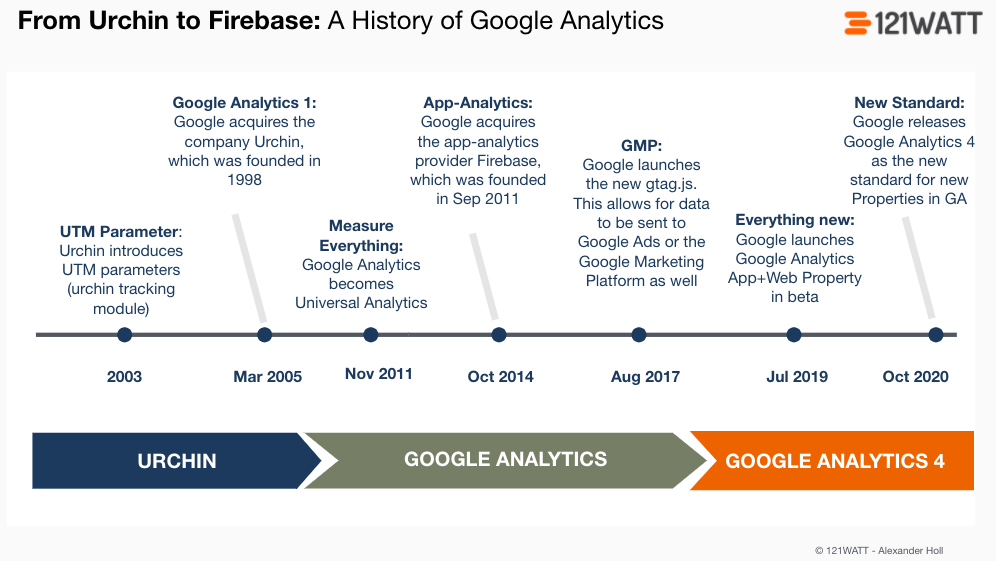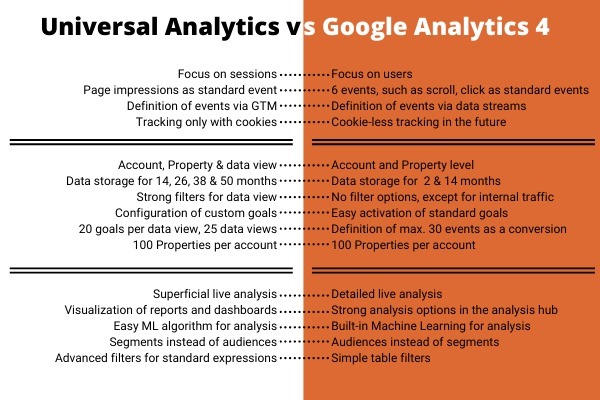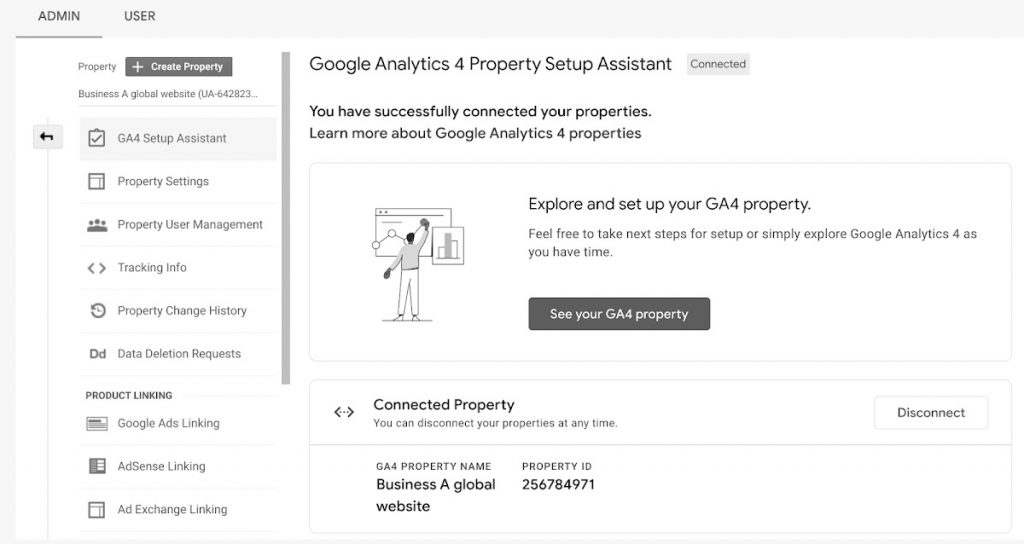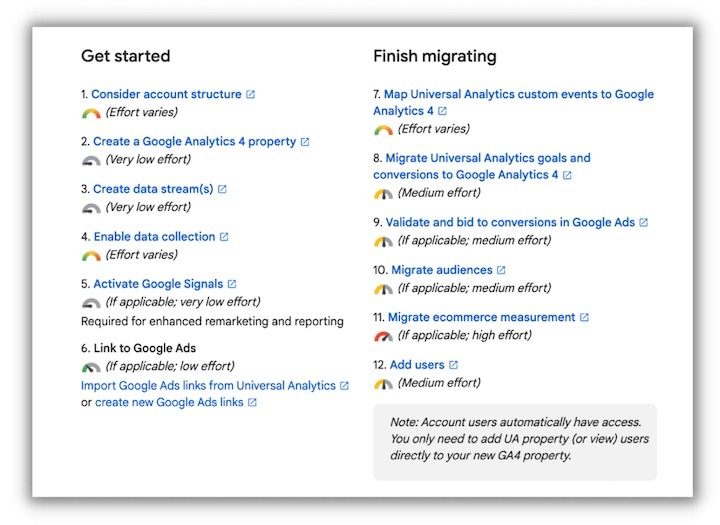Google to Discontinue Universal Analytics: What eCommerce Marketers Need to Know
On July 1, 2023, Google is ending Google Analytics. Referred to as Universal Analytics (UA), Google Analytics has been the go-to tracking tool for online store and PPC performance since 2005. If you’re using Universal Analytics 360 properties, you will have until the 1st of October 2023.
Despite its many add-ons, updates, and improvements since its launch, Google Analytics is becoming obsolete. Instead, Google will replace it with the newer generation Google Analytics 4 (GA4), which is far more capable of tracking and measuring cross-channel behavior.
How? GA4 is designed to measure data across websites and apps and will offer eCommerce marketers far better insights.
So what does this mean for eCommerce brands and marketers, and what do online stores need to do to ensure they are prepared ahead of time for the change?
This post answers these and other essential questions on Google’s decision to sunset Universal Analytics and what online retailers should be doing. Including:
- Why Is Universal Analytics Becoming Obsolete?
- What Is Google Analytics 4?
- Universal Analytics vs. Google Analytics 4
- GA4 Scheduling: How Will the Change Take Place?
- What Do eCommerce Marketers Need to Do Before July 2023?
Let’s get started.
1. Why Is Universal Analytics Becoming Obsolete?
Universal Analytics (UA) has been around since 2012, offering a new and improved version of Google’s Analytics in 2012, and has been the default since then.
UA was cemented at a time when online measurement relied on desktop and independent session tracking. Additionally, at the time of its conception, the privacy preference landscape was very different than it is today.
Relying heavily on cookies for third-party tracking, and despite Google implementing a variety of privacy control upgrades, Google’s new Analytics 4 has been designed to enhance privacy. Or, in Google’s own words:
“Universal Analytics was built for a generation of online measurement that was anchored in the desktop web, independent sessions, and more easily observable data from cookies. This measurement methodology is quickly becoming obsolete.”
Am I Using Universal Analytics?
Launched in October of 2020, Google Analytics 4 has already been around for nearly two years, and it is already the default property. Therefore, it is very likely that if you created an analytics account before October 2020, you are still using the Universal Analytics property.
So how do you check which analytics property type you’re using? By following these steps:
- Open your analytics account
- Click the drop-down arrow next to the property name
- Check the property ID number
Google Analytics property ID is the identifier associated with your account and used by Google Analytics to collect the data. If the number starts with UA and ends with a number, then that property is using Universal Analytics.
2. What Is Google Analytics 4?
Google Analytics 4 was first introduced by Google toward the end of 2020, and is now the latest version of Google analytics. Designed for multi-platform tracking, it offers better connecting of off- and online engagement and is built for better customer experience and privacy.
Unlike previous generations, GA4 doesn’t rely exclusively on cookies. Instead, it uses even-based data modeling for more customer-centric measurement, giving more control over data collection and usage.
Google Analytics 4 offers eCommerce marketers:
- Easier integration with other Google products
- Increased data-driven attribution
- Better insights across a variety of touchpoints
- Built-in predictive user behavior insights powered by machine learning
3. Universal Analytics vs. Google Analytics 4
Google Analytics 4 isn’t just a new generation UA upgrade. It’s an entirely new tool that’s been built differently from the foundation up. Its primary focus was to be able to keep up with changing privacy and reporting needs.
Here are some of the most critical differences between Universal Analytics and Google Analytics 4:
- Privacy. Unlike UA, GA4 doesn’t rely on cookies, making GA4 more privacy-friendly. Additionally, the default for Google Analytics 4 is to anonymize users’ IP addresses by default.
- Cross-device insights. GA4 has been created specifically to deal with far more complex customer journeys that cross from websites to apps.
- Events and sessions. G4A takes more than page views into account. While UA is session-based, GA4 is event-based, making the latter better at tracking video plays, button clicks, and more events.
- Machine learning. GA4 is built around machine learning and automation technology, enabling it to predict and share more detailed insights. This also allows it to supply data modeling, closing data gaps.
- Structure. GA4 does away with data view and filters instead of including filters for better reports. Here’s a walkthrough of the Google Analytics 4 user interface for a deeper look:
4. GA4 Scheduling: How Will the Change Take Place?
Now that we know why Google is discontinuing Universal Analytics and why Google Analytics 4 is a better tracking tool for today’s eCommerce marketing, let’s look at how Google is going to make it happen.
- If you’re using Universal Analytics properties, data collection will continue until July 1, 2023
- From July 1st, Google Analytics 4 will be the default Analytics tool
- After July 1st, for at least six months, marketers will still be able to access previously processed data
- For larger online retailers using Google Analytics 360, you will have until October 1, 2023, before the default changes from UA to GA4
5. What Do eCommerce Marketers Need to Do Before July 2023?
So, what should eCommerce marketers do before the change? The first thing you should do is to
check if you’re using Universal Analytics for any of your properties and backup up your UA data.
Then, if you still use Universal Analytics, you will need to:
- Switch to GA4 ASAP. To do this, you will want to set up a GA4 property with your existing UA property. However, you should follow this Google guide and use GA4 Setup Assist to ensure you’re doing it correctly.
- Export reports. Although UA data will be acceptable for a least six months after the change, you want to export individual reports and BigQuery and set yourself up to use the Google Analytics Reporting API as soon as possible.
- Update Google Ads tracking. Next, you will need to update your Google Ads tracking. It’s likely that you have conversion tracking set up. Therefore you need to import GA4 conversion in Google Ads and remove any UA goals.
Final Thoughts: Google Analytics 4 Is Coming. Are You Ready?
There you have it, everything you need to know about Google’s change from Universal Analytics to Google Analytics 4. There is no doubt that the new analytics property is much better suited to today’s cross-channel shopper and will offer better insights while improving privacy.
And if Google Analytics 4 offers better tracking, why wait? If you’re still on UA, it’s best to start migrating as soon as possible so that you are not only prepared for the change, but enjoy the benefits sooner rather than later.
Have questions? Post in the comments below — our Analytics experts are standing by to help.


Mushon Heinisch
Mushon is the Head of Media at StoreYa.
He’s a PPC expert specializing in Facebook, Google, and Instagram eCommerce campaigns.
Comments
comments
Powered by Facebook Comments

